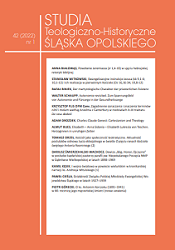Zagadnienie oznaczania i znaczenia terminów nihil i malum według Anzelma z Canterbury w rozdziałach X–XI traktatu De casu diaboli
The Question of the Indication and Meaning of the Terms nihil and malum According to Anselm of Canterbury in Chapters X–XI of the Tract De casu diaboli
Author(s): Krzysztof FlisSubject(s): Christian Theology and Religion, Philosophy of Middle Ages, Philosophy of Religion
Published by: Uniwersytet Opolski
Keywords: Anselm of Canterbury; evil; nothing; meaning;
Summary/Abstract: This article is an attempt to analyse the views of St. Anselm of Canterbury regarding the reference of the terms nihil and malum. In the first part of the article the aim of Anselm’s philosophy and the method he uses are characterised. Then the category of rectitudo, which is the supreme principle of Anselm’s doctrine, was discussed. It is the rule of action of the whole creation according to the Creator’s plan. Rectitudo also has a normative dimension because it is such an action of created beings which, in fulfilling their duties, make restitution and with the Creator’s help regain the lost original state. The last part contains the characteristics of the theory of language, including the analysis of two meanings of the verb significare. In Polish these two senses are rendered by the terms: mean and signify. A statement means something when it is a carrier of content and signifies when it is properly constructed and states what is. Analysing the terms “nothing” and “evil”, Anselm emphasises that they mean but do not signify. He also gives a definition of evil as the absence of what ought to be or is beneficial to be. Although “nothing” and “evil” are not actually something, they are nevertheless spoken of as if they were something existing. Anselm rejects arguments for the thesis that evil is something. In doing so, he refers to the definition of evil as lacking something, and to the fact that the existence of a name does not imply the existence of the entity denoted by that name.
Journal: Studia Teologiczno-Historyczne Śląska Opolskiego
- Issue Year: 42/2022
- Issue No: 1
- Page Range: 95-111
- Page Count: 17
- Language: Polish

